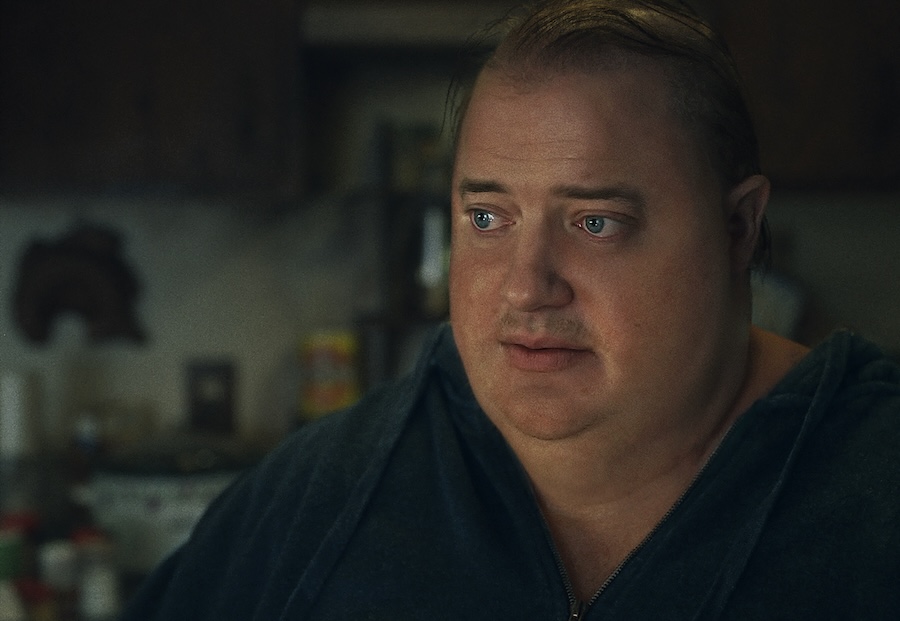

In 2006, Brendan Fraser was still at the beginning of his downfall as a movie star, a phase where he couldn’t find many good parts. There would be disappointments in TV and film as well as on stage, combined with a divorce, health problems and a depression. An appearance on the TV show The Affair in 2016 brought some attention – and then came The Whale, the film that won him an Oscar. It all started with director Darren Aronofsky noticing him in 2006, in a little-seen Brazilian film he made.
Hiding from his students
When we first meet Charlie (Fraser), we can’t see him, nor can his students. His writing classes are taught on Zoom, but he keeps his webcam turned off, blaming it on technical issues. In fact, he keeps it off because he doesn’t want his students to see what he looks like, a man trapped in his home due to morbid obesity. He has a friend, Liz (Hong Chau), who’s a nurse and helps him as much as she can… but he doesn’t have insurance and they both know that his heart is about to give up any day now.
Suddenly, he gets a visit from two young people: Thomas (Ty Simpkins), a naive missionary who thinks he can save Charlie, and Ellie (Sadie Sink), his teenage daughter whom he abandoned many years ago when he fell in love with a male student. Their relationship is filled with anger and regrets.
Expected complaints
Aronofsky had an eye for what Fraser might bring to the role of Charlie; perhaps a former movie star, down on his luck, could identify with this character? It wasn’t easy finding the right actor for a role like this, and the expected complaints about Aronofsky not choosing an obese performer would come, as if actors aren’t allowed to do anything else but play themselves. There would be other related complaints about the film, perhaps more difficult to ignore. There were accusations of fatphobia, that the filmmakers were wallowing in Charlie’s miserable, suffering state and his unhealthy relationship with food.
This is not fatphobia, it is brutal honesty, and we feel for Charlie.
But the film does not depict fat people in general, those who struggle with a few extra pounds. This is a portrait of a man whose eating habits have turned into a sickness that will kill him. This is not fatphobia, it is brutal honesty, and we feel for Charlie. Fraser had to get used to wearing prosthetics that weighed 300 pounds, making him understand his character’s hardship better; his performance is often tough to watch. Equally good is Chau as his straight-talking, protective friend.
The Whale addresses the oppressive weight of religious fanaticism, closeted homosexuality and the urgent need to make amends before you die, inviting comparisons with Melville’s ”Moby-Dick”. Always compelling because of great acting and a darkness that’s hard to ignore, the film also has ingredients and a tone that’s challenging. At times, the pain becomes merely a chore for us to watch, especially as Charlie’s exceptionally hostile daughter becomes a key figure in the story. Aronofsky comes dangerously close to mawkishness in a few scenes… but the film is ultimately a moving and warm experience.
The Whale 2022-U.S. 117 min. Color. Directed by Darren Aronofsky. Screenplay, Play: Samuel D. Hunter. Cast: Brendan Fraser (Charlie), Sadie Sink (Ellie), Hong Chau (Liz), Ty Simpkins, Samantha Morton.
Trivia: Co-produced by Aronofsky. At an earlier stage, James Corden was considered for the lead; Tom Ford and George Clooney were up for directing duties. In flashbacks, Ellie as a child is played by Sink’s sister, Jacey.
Oscars: Best Actor (Fraser), Makeup and Hairstyling.
Last word: “As far as The Whale, I remember reading the review in the New York Times and being like, ‘Wow, what a bizarre, crazy story to try to bring to the stage. What a unique character.’ So I was fascinated to go see it. And when it started, it was just characters that I, on the surface, could never understand or relate to, but by the end of the play, my heart was broken and I knew these characters like I knew members of my family.” (Aronofsky, Los Angeles Times)
